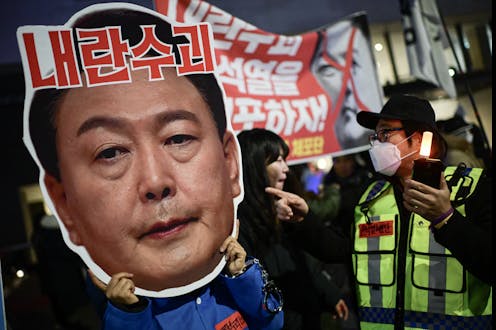A South Korean court extended President Yoon Suk Yeol's detention by 20 days on Sunday, igniting violent protests by hundreds of his supporters. Demonstrators stormed the court building, smashing windows and clashing with riot police. The unrest follows Yoon’s arrest last week over insurrection allegations tied to his controversial December 3 martial law declaration, which has plunged the nation into political chaos.
The court’s decision, announced early Sunday, cited concerns that Yoon might destroy evidence. Protesters overwhelmed police, using fire extinguishers and damaging property before order was restored. Authorities arrested 46 individuals involved in the clashes.
Yoon, the first sitting South Korean president to face arrest, has denied the insurrection charges and refused questioning by the Corruption Investigation Office (CIO). His lawyers argue the arrest was illegal, claiming jurisdictional errors. Insurrection charges, exempt from presidential immunity, carry a maximum penalty of death, although South Korea has not executed anyone in decades.
Yoon's impeachment on December 14 suspended his presidential powers. His martial law declaration and subsequent turmoil led to a collapse in his People Power Party's (PPP) support, which has since rebounded. A Gallup Korea poll shows the PPP narrowly leading the opposition Democratic Party, 39% to 36%.
The opposition hailed the court's decision as a victory for constitutional order, while Yoon’s PPP criticized it as excessive. Yoon remains in solitary detention at Seoul Detention Centre as the Constitutional Court deliberates on his impeachment.
The CIO pledged to proceed lawfully with its investigation. Meanwhile, Yoon’s lawyer urged calm, warning against further violence. As political tensions escalate, the future of Yoon's presidency hangs in the balance.



 Supreme Court Tests Federal Reserve Independence Amid Trump’s Bid to Fire Lisa Cook
Supreme Court Tests Federal Reserve Independence Amid Trump’s Bid to Fire Lisa Cook  Minnesota Judge Rejects Bid to Halt Trump Immigration Enforcement in Minneapolis
Minnesota Judge Rejects Bid to Halt Trump Immigration Enforcement in Minneapolis  Trump Allows Commercial Fishing in Protected New England Waters
Trump Allows Commercial Fishing in Protected New England Waters  India–U.S. Interim Trade Pact Cuts Auto Tariffs but Leaves Tesla Out
India–U.S. Interim Trade Pact Cuts Auto Tariffs but Leaves Tesla Out  Pentagon Ends Military Education Programs With Harvard University
Pentagon Ends Military Education Programs With Harvard University  Norway Opens Corruption Probe Into Former PM and Nobel Committee Chair Thorbjoern Jagland Over Epstein Links
Norway Opens Corruption Probe Into Former PM and Nobel Committee Chair Thorbjoern Jagland Over Epstein Links  Federal Judge Signals Possible Dismissal of xAI Lawsuit Against OpenAI
Federal Judge Signals Possible Dismissal of xAI Lawsuit Against OpenAI  Uber Ordered to Pay $8.5 Million in Bellwether Sexual Assault Lawsuit
Uber Ordered to Pay $8.5 Million in Bellwether Sexual Assault Lawsuit  U.S. to Begin Paying UN Dues as Financial Crisis Spurs Push for Reforms
U.S. to Begin Paying UN Dues as Financial Crisis Spurs Push for Reforms  Missouri Judge Dismisses Lawsuit Challenging Starbucks’ Diversity and Inclusion Policies
Missouri Judge Dismisses Lawsuit Challenging Starbucks’ Diversity and Inclusion Policies  TrumpRx Website Launches to Offer Discounted Prescription Drugs for Cash-Paying Americans
TrumpRx Website Launches to Offer Discounted Prescription Drugs for Cash-Paying Americans  Trump Lawsuit Against JPMorgan Signals Rising Tensions Between Wall Street and the White House
Trump Lawsuit Against JPMorgan Signals Rising Tensions Between Wall Street and the White House  U.S. Lawmakers to Review Unredacted Jeffrey Epstein DOJ Files Starting Monday
U.S. Lawmakers to Review Unredacted Jeffrey Epstein DOJ Files Starting Monday  Federal Judge Restores Funding for Gateway Rail Tunnel Project
Federal Judge Restores Funding for Gateway Rail Tunnel Project  U.S. Condemns South Africa’s Expulsion of Israeli Diplomat Amid Rising Diplomatic Tensions
U.S. Condemns South Africa’s Expulsion of Israeli Diplomat Amid Rising Diplomatic Tensions  Panama Supreme Court Voids CK Hutchison Port Concessions, Raising Geopolitical and Trade Concerns
Panama Supreme Court Voids CK Hutchison Port Concessions, Raising Geopolitical and Trade Concerns  Nighttime Shelling Causes Serious Damage in Russia’s Belgorod Region Near Ukraine Border
Nighttime Shelling Causes Serious Damage in Russia’s Belgorod Region Near Ukraine Border 































